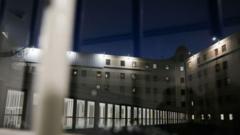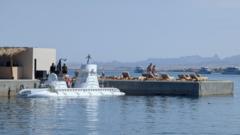France has unveiled plans to build a high-security prison in French Guiana, intended to house drug traffickers and radical elements amid growing violence linked to organized crime.
France to Construct High-Security Prison in Amazon Basin to Combat Organized Crime

France to Construct High-Security Prison in Amazon Basin to Combat Organized Crime
New high-security facility aims to disrupt drug trafficking networks from within the remote Amazon region.
The French government, represented by Justice Minister Gérald Darmanin, recently announced the construction of a €400 million prison deep in the Amazon jungle, approximately 500 kilometers from the mainland. Set to be operational by 2028, this facility will support France's ongoing battle against organized crime, particularly concerning drug trafficking.
The decision follows a series of violent attacks on prison staff and facilities across France, which the ministry has attributed to drug gangs reacting against increased governmental pressure and legislative reform. The new prison will aim to detain and manage individuals at various stages of the drug supply chain, effectively targeting the most dangerous criminals.
Darmanin highlighted that the prison, situated in the isolated Saint-Laurent-du-Maroni region, would be governed by strict regulations designed to minimize contact between prisoners and their networks. With a capacity of 500 inmates, including a specialized section for the most severe offenders, the facility is expected to serve as a significant deterrent against drug-related crime in mainland France.
The project aligns with broader legislative measures that the French government has enacted in response to increased organized crime activity. These include establishing a specialized office for organized crime prosecutions, enhancing the powers of investigators, and introducing special protections for informants.
French Guiana, a territory that enjoys comprehensive civic rights as part of France, has historically functioned as a transit point for illicit drug trafficking. Authorities expect the new prison to serve not only as a detention center but also as a strategic blow against drug lords, isolating them from their operations and support systems.
This venture marks a significant step in France's efforts to control the rampant infiltration of criminal activities within its criminal justice system. With reported communication breakdowns between prisoners and their networks in mainland France, the French government hopes to dismantle these criminal enterprises from their roots.
Historically, the area has a notable significance, previously hosting the infamous Devil's Island penal colony. The site symbolizes France's long legacy of penal reforms and societal challenges associated with crime and punishment.
In conclusion, the establishment of this new facility reflects France's resolve to tackle escalating organized crime through significant deterrent measures and a comprehensive approach to reforming its penal system.
The decision follows a series of violent attacks on prison staff and facilities across France, which the ministry has attributed to drug gangs reacting against increased governmental pressure and legislative reform. The new prison will aim to detain and manage individuals at various stages of the drug supply chain, effectively targeting the most dangerous criminals.
Darmanin highlighted that the prison, situated in the isolated Saint-Laurent-du-Maroni region, would be governed by strict regulations designed to minimize contact between prisoners and their networks. With a capacity of 500 inmates, including a specialized section for the most severe offenders, the facility is expected to serve as a significant deterrent against drug-related crime in mainland France.
The project aligns with broader legislative measures that the French government has enacted in response to increased organized crime activity. These include establishing a specialized office for organized crime prosecutions, enhancing the powers of investigators, and introducing special protections for informants.
French Guiana, a territory that enjoys comprehensive civic rights as part of France, has historically functioned as a transit point for illicit drug trafficking. Authorities expect the new prison to serve not only as a detention center but also as a strategic blow against drug lords, isolating them from their operations and support systems.
This venture marks a significant step in France's efforts to control the rampant infiltration of criminal activities within its criminal justice system. With reported communication breakdowns between prisoners and their networks in mainland France, the French government hopes to dismantle these criminal enterprises from their roots.
Historically, the area has a notable significance, previously hosting the infamous Devil's Island penal colony. The site symbolizes France's long legacy of penal reforms and societal challenges associated with crime and punishment.
In conclusion, the establishment of this new facility reflects France's resolve to tackle escalating organized crime through significant deterrent measures and a comprehensive approach to reforming its penal system.


















